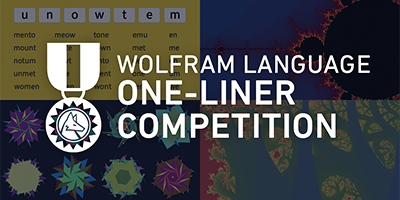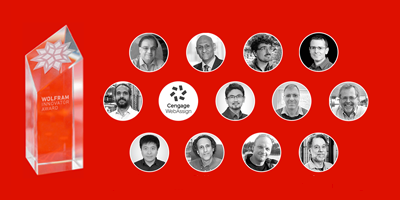Wolfram Middle School Summer Camp: A Virtual Learning Experience

This post discusses the Wolfram Middle School Summer Camp. You can read about various Wolfram education programs and the Wolfram High School Summer Research Program.
This summer marks the fifth annual Wolfram Middle School Summer Camp. Students at the camp learn the basics of Wolfram Language and make connections with other young STEM enthusiasts from around the world. Our goal with this fully virtual camp is to offer an on-ramp into other Wolfram programs for girls and gender non-conforming students with diverse academic backgrounds.
I’ve had the joy of running the camp alongside Program Director Rory Foulger since 2023 and am eager to walk through everything that goes into creating this experience.
Who’s Who
The Wolfram Middle School Summer Camp, along with other programs in the Wolfram education ecosystem, utilizes a “near-peer” framework for staffing. The primary staff for the camp are the mentors; these are high-school or college students who have been successful in Wolfram programs in previous years. Most often, mentors are alumni of the Wolfram High School Summer Research Program and the Wolfram Emerging Leaders Program (WELP). Two of our mentors for 2025 not only completed the Wolfram High School Summer Research Program but also started their journeys with Wolfram as students at the Wolfram Middle School Summer Camp!
Near-peer instruction allows our mentors, who share many qualities with our students, to deeply engage campers in their teaching. They’re experts in Wolfram Language and have engaged in a year of teacher training as part of WELP, so they can offer both a close relationship and high-quality instruction.
Mentors at the camp have a hand in almost every part of it. The mentors lead class blocks, assist students during explorations and design and run social activities. In previous years, mentors, who act as role models, teachers and social leaders for the students, have always been ranked as the best part of the camp.
In addition to the mentors, the camp is run by the same director team as other Wolfram education programs. We build a scaffolded curriculum and work directly with students along every step of the experience, assisting with the application process, leading program activities and supporting post-camp experiences.
Running a Virtual Program
While we started the Wolfram Middle School Summer Camp as a virtual camp due to the pandemic, we quickly found that being fully virtual was a major positive for the students. The camp is live and hands on, allowing students from all over the world to attend. Parents don’t need to worry about travel or about their child participating in a residential program before they’re ready, and students can study from the comfort of their own homes. A majority of our students are from the United States, but we’ve had students from all over the world, including Canada, the United Arab Emirates, India and Germany, attend.
We design both academic and social activities to not just account for the challenges of virtual teaching, but take advantage of it, like utilizing breakout rooms or choosing activities that are made specifically for online participation.
Learning Wolfram Language

Classes
We spend around half of the camp in classes. Each class covers a new area of functionality or a collection of related functions, ranging from manipulating lists and defining functions to creating graphics and audio. In their classes, our mentors balance teaching with hands-on activities. For each topic, concept or function within a class, students typically spend 15 minutes learning new content and 15 minutes with a mentor working on practical activities and exercises in small breakout groups.
We aim for students to not just learn what a function is, but for them to get comfortable with how to use it in different ways. Rather than listening to lectures, students spend time experimenting and working together in groups to solve problems, while also gaining the confidence they need to write their own code.
Explorations
While they are hands on, the activities students complete during class blocks are relatively short. Students at the camp explore computation deeper and build problem-solving skills with mini-projects we refer to as “explorations.” These explorations allow students to use the skills they’ve learned in class on more complex problems and learn about Wolfram Language outside of the core functionality covered in classes. The tasks in our explorations are complicated enough that students will gain experience in computational thinking and breaking down more complex programming problems, while still providing clear goals that students can reach within roughly an hour.

These explorations are expanded and updated with each new year of the camp, and new explorations are added based on new areas of functionality or student interests in the previous year. Some long-standing explorations include completing scavenger hunts for data within the Wolfram Knowledgebase, implementing image identifiers using machine learning and creating generative graphics and other forms of computational art.

Having a variety of these explorations not only allows us to expose students to a lot of different topics but also allows us flexibility in difficulty level. Explorations may have “extensions”—optional stretch goals for the students who want an extra challenge. Conversely, many of these explorations have smaller warm-up activities or a baseline goal that is simpler than the final goal for students who may need more time to grasp the necessary concepts. We consider not just the individual exploration, but all the explorations as a whole. We balance fun and complexity, with the goal that all students should have multiple explorations they would not only be able to complete but find fun or interesting.
Students get to pick which explorations they tackle during the week, which means if they are interested in a particular topic, want more practice with a certain function or just want to take a break from one exploration to try another, they can! We aim for every student to fully finish at least one exploration, which gives them the flexibility to try a lot of them during the camp while still having a finished project to take “home” with them.

Here are two computational art activities from the camp where students design repeating patterns to practice using Graphics and iterating functions like Table and create “wallpapers” while learning about representing images, pixels and colors in Wolfram Language.
Other Activities
Falling in between academic activities and social activities, we also show students a variety of experiences and perspectives on STEM through panels and Q&A sessions.
Panels
The camp holds two panels toward the end, and these serve to encourage our students to think about the possibilities they have for their futures. The first of these panels features Wolfram employees discussing their different paths in STEM and how they got where they are today. The second features the camp’s mentor team and is focused on their experiences in high school or college as well as their experiences with other Wolfram programs.
Stephen Wolfram at the Wolfram Middle School Summer Camp
In addition to Wolfram employees and the mentor team, students also get the opportunity to interact with Wolfram Research CEO Stephen Wolfram. Typically, the camp offers a Q&A session where students can ask questions about academics, science and life in general. Additionally, at the end of the program, students meet with Wolfram in smaller groups where they can ask further questions or discuss whatever interests them.

Social Activity
Despite being a virtual program, the camp has lots of social activities to encourage students to take breaks while working, foster friendships between students and just have fun!

Here are two sections from the Wolfram Middle School Summer Camp 2024’s “Camp Memories.” For the final social activity every year, students create a collaborative board of highlights and favorite moments from the camp.
Social activities are designed and facilitated by our mentors; each mentor is responsible for one or two activities, and the directors work with the mentor team to create a fun and balanced social activity schedule. This schedule balances what type of activity the students are doing (physical, academic, artistic) and interaction with their peers (individual activities, team competitions, group discussions). Favorite activities from previous years have been show-and-tell scavenger hunts, origami and drawing, and PowerPoint karaoke.
In addition to varying the type of activity, we also vary how computer dependent the activity is. While both students and staff enjoy online games like skribbl.io and GeoGuessr, we also mix in activities that are more relaxed and require students to take breaks from looking at their screens, like origami or yoga.

Beyond the Summer
The Wolfram Middle School Summer Camp is just the first step into Wolfram technology for young students. Students who attend the camp are in a fantastic position to attend the Wolfram High School Summer Research Program once they are 14. You can read more about the Wolfram High School Summer Research Program in the other blog posts from this series.
After completing higher-level Wolfram programs, students who have attended the Wolfram Middle School Summer Camp can also consider coming back to camp as mentors!
Applications for the Wolfram Middle School Summer Camp and the Wolfram High School Summer Research Program open in November each year, and we hope to see you, your children or your students there!
Find more information about other educational opportunities:
- Wolfram Emerging Leaders Program »
- Wolfram U: Creative Computation »
- Wolfram Student Ambassador Initiative »
- Computational Adventures »
| Watch the full “AMA: Wolfram’s Summer Education Programs” to hear Eryn and Rory answer questions about the Wolfram High School Summer Research Program and the Wolfram Middle School Summer Camp. |



Comments